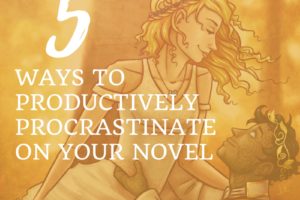For those who don’t know, Ultimate Spider-Man is an (admittedly pretty terrible) cartoon on Disney XD. The first season was on Netflix, so during my superhero cartoon phase last spring I watched it all, and I’ve occasionally dipped back in throughout the second season.
Even though this is the show everyone loves to hate, there are some writing tips you can glean from what it does well and what it does… not so well.
1. Peter Parker is what makes Spiderman interesting.
Peter Parker is a geeky, every-day guy who also happens to have spidery superpowers. That’s the heart of his conflict—how to balance or maintain his two very different lives.
But when the whole story becomes about his crime-fighting, smart-mouthing hero personality, Spiderman, well… it becomes a meaningless excuse for extended fight scenes where everyone is masked and the largest stake is Spiderman getting punched (because we know he isn’t going to die).
It’s the juicy bits where Peter and Spiderman’s identities overlap—or threaten to—that really pull weight, that really make you want to keep watching.
If you have a superhero character (from Iron Man to Sherlock Holmes to Harry Potter), what makes them interesting is their weaknesses, not their strengths. What makes their extraordinary lives compelling is how their personal lives interfere with the life they want to be living.
(For the record, I think the first season of Ultimate Spider-Man did this tolerably. The second season has been so full of Spiderman-centric filler episodes I’m pretty sure an arc doesn’t exist. Speaking of…)
2. Without an arc, you lose your audience.
Sure, kids probably keep watching because most cartoons have no arc to them and exist for mindless entertainment. But if you want your story to be something deeper, you’ve got to have an arc. The Last Airbender is an epic example of a cartoon that used good storytelling techniques to build a rabid fanbase.
In the same way, books need multiple arcs. Most really good books can be broken down into one big arc, smaller arcs for the first, second and third acts, and compact arcs per chapter (plus the character arcs that weave through the story as a whole).
Every chapter should contribute to the arcs, or else the chapter needs to go. Too many filler chapters, and you have yourself a mindless cartoon.
3. Don’t be so concentrated on what you think needs to happen that you miss organic plot tensions.
In the most recent episode of Ultimate Spider-Man, a familiar character on the show appears as the Iron Patriot (hint: It’s not anyone remotely related to Tony Stark). Here would be some organic tensions to this scenario: How was the suit acquired and does (or should) Tony Stark have a bone to pick about it? Why is a bad-guy-turned-good-guy arming himself in literally the most advanced weaponry available and then running around New York? Or how about when said character’s son walks in and sees his dad in a suit surrounded by villains, but instead of confronting any of this the son just… explodes at Spiderman, because reasons? Where’s the father/son conflict or the we’re-n0w-a-target-for-villains-is-it-worth-the-cost conflict?
This is something TV writers in particular can be pretty terrible at. An episode has to be so focused, has to work so tightly, that writers often aren’t open to exploring the organic problems and instead put all the spotlight on the generic tension they want to create.
In your own work, feel free to plan ahead (I’m an outline freak myself) but also be open when an unexpected tension arises. Try to keep an eye out for any time your character acts a certain way because it’s what you want, as often this can repress potential for good, organic tension. (Note: Your friends/beta readers/critique partners often spy these potentials when you overlook them. Just ask, “Is my character doing anything that doesn’t make sense?”)
See? You can learn a thing or two even from a cartoon!
What good tips have you learned from stupid shows? Leave a comment!

















